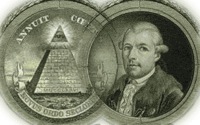Difference between revisions of "Illuminati"
From Nordan Symposia
Jump to navigationJump to searchm (Text replacement - "http://nordan.daynal.org" to "https://nordan.daynal.org") |
|||
| Line 8: | Line 8: | ||
:a. Applied to a [[sect]] of Spanish [[heretics]] which existed in the 16th c. under the name ''Alumbrados'' or ‘[[enlightened]]’; subsequently, to a similar but obscure sect of [http://en.wikipedia.org/wiki/Familists Familists] which arose in France in [http://en.wikipedia.org/wiki/Louis_xiii Louis XIII]'s reign | :a. Applied to a [[sect]] of Spanish [[heretics]] which existed in the 16th c. under the name ''Alumbrados'' or ‘[[enlightened]]’; subsequently, to a similar but obscure sect of [http://en.wikipedia.org/wiki/Familists Familists] which arose in France in [http://en.wikipedia.org/wiki/Louis_xiii Louis XIII]'s reign | ||
:b. b. Used to render German ''Illuminaten'', the name of a celebrated [http://en.wikipedia.org/wiki/Secret_society secret society], founded at Ingolstadt in Bavaria, in 1776, by Professor [http://en.wikipedia.org/wiki/Adam_Wwishaupt Adam Weishaupt], holding [http://en.wikipedia.org/wiki/Deism deistic] and republican principles, and having an [[organization]] akin to [http://en.wikipedia.org/wiki/Freemasonry freemasonry]; hence applied to other thinkers regarded as [[atheistic]] or [[free]]-thinking, e.g. the [http://en.wikipedia.org/wiki/Encyclop%C3%A9distes French Encyclopædists]. | :b. b. Used to render German ''Illuminaten'', the name of a celebrated [http://en.wikipedia.org/wiki/Secret_society secret society], founded at Ingolstadt in Bavaria, in 1776, by Professor [http://en.wikipedia.org/wiki/Adam_Wwishaupt Adam Weishaupt], holding [http://en.wikipedia.org/wiki/Deism deistic] and republican principles, and having an [[organization]] akin to [http://en.wikipedia.org/wiki/Freemasonry freemasonry]; hence applied to other thinkers regarded as [[atheistic]] or [[free]]-thinking, e.g. the [http://en.wikipedia.org/wiki/Encyclop%C3%A9distes French Encyclopædists]. | ||
| − | <center>For lessons on the [[topic]] of the '''''Illuminati''''', follow [ | + | <center>For lessons on the [[topic]] of the '''''Illuminati''''', follow [https://nordan.daynal.org/wiki/index.php?title=Category:Illuminati '''''this link'''''].</center> |
==Description== | ==Description== | ||
Revision as of 22:31, 12 December 2020
Origin
Plural of Latin illūminātus , Italian -ato ‘enlightened’
Definitions
- 1: With pl. concord. A name assumed by or applied to various societies or sects because of their claim to special enlightenment in religious, or (later) intellectual, matters.
- a. Applied to a sect of Spanish heretics which existed in the 16th c. under the name Alumbrados or ‘enlightened’; subsequently, to a similar but obscure sect of Familists which arose in France in Louis XIII's reign
- b. b. Used to render German Illuminaten, the name of a celebrated secret society, founded at Ingolstadt in Bavaria, in 1776, by Professor Adam Weishaupt, holding deistic and republican principles, and having an organization akin to freemasonry; hence applied to other thinkers regarded as atheistic or free-thinking, e.g. the French Encyclopædists.
Description
The Illuminati (plural of Latin illuminatus, "enlightened") is a name given to several groups, both real (historical) and fictitious. Historically the name refers to the Bavarian Illuminati, an Enlightenment-era secret society founded on May 1, 1776. In more modern contexts the name refers to a purported conspiratorial organization which is alleged to mastermind events and control world affairs through governments and corporations to establish a New World Order. In this context the Illuminati are usually represented as a modern version or continuation of the Bavarian Illuminati.[1]
